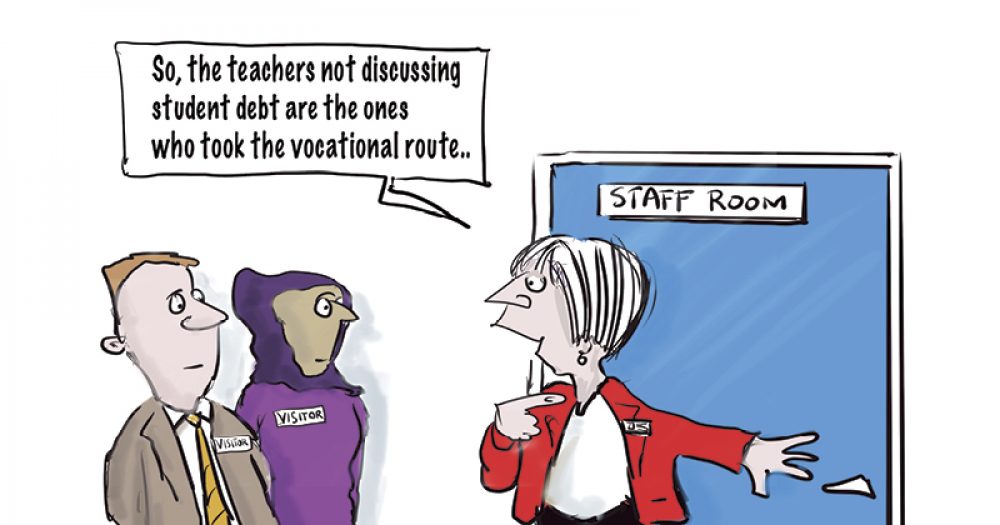A group of schools hoping to create a fully vocational pathway to qualified teacher status (QTS) has passed its first hurdle after the government approved its plans for a new apprenticeship for teaching assistants.
The framework, drawn up by 11 schools in Buckinghamshire and the West Midlands and first revealed by Schools Week in January, will allow apprentice teaching assistants (TAs) to get level 3 qualifications equivalent to A-levels while training on the job.
Although apprenticeships for TAs and similar classroom positions have been available for some time, this is the first bid that has made clear its intention of creating a vocational route to QTS.
Standards for the TA pathway are now being finalised while plans for a “flagship” full apprenticeship for teachers are being drawn up for submission to the Department for Education (DfE). Developers say they are “95 per cent certain” they will be signed off.
The move was prompted partly by a government announcement that schools and academy trusts with more than 250 employees would be subject to new public sector apprenticeship targets, and that those with a payroll bill of more than £3 million would have to contribute to the new apprenticeship levy.
Jenny Brinkworth, office manager at Buckinghamshire’s Hughenden primary school who wrote the TA bid sent to government, told Schools Week that the group was “keen to get started” on the apprenticeship and looked forward to “working with a dedicated team of professionals to create a teaching assistant standard, thus securing future apprenticeship opportunities in schools”.
She said representatives from City & Guilds, National Schools Training (NST), Walsall College, Buckinghamshire Adult Learning, Profile Development and Training and Hackney Learning Trust had been invited to play “important supporting roles on the creation of the trailblazer standard and assessment plan”.
If approved, the full teaching apprenticeship, which is now being designed in partnership with the Teaching Schools Council, will allow learners to train up to level 7, equivalent to a postgraduate degree, and achieve QTS without having to go to university – all while being paid.
The group believes that the scheme could help to boost the number of trainees entering teaching and meet the government’s pledge of generating three million apprenticeship starts by 2020.
Lee Povah, director at apprenticeship provider NST, said he was “95 per cent certain” that the full teaching apprenticeship pathway would be signed off by government.
He told Schools Week: “When we first met with the DfE they said ‘yes, you’re pushing an open door with the teaching apprenticeship pathway’. So they told us to crack on and see how many schools we can engage with.
“We put a call to arms out to the schools in our network and we had more than 350 register to support the pathway, which is unbelievable. This is certainly going to be a flagship scheme within education.”
Povah said that schools were eager for the full teaching apprenticeship to be approved because they wanted to use the money they were paying out in the apprenticeship levy on “appropriate frameworks that help us to develop our staff”.







There has to be an apprenticeship of some kind as large schools will have to pay the apprenticeship levy and there needs to be something that can buy back from it. However, it is on no way decided if this will be at degree or masters level. Why create yet another route into teaching when the Carter review has highlighted the current complexity as a problem? Why not allow the school apprenticeship levy to be reclaimed for CPD and leadership development and invested in ongoing rather than initial development? There are already routes for TAs without degrees to vocationally get to QTS why create yet another? How will the QTS stand rads sit with the apprenticeship standards? The whole concept is problematic.
TA’s get paid less than teachers. So a TA with QTS can be given a timetable equivalent to a teacher and save the school money. Its a way to get more classroom teachers for less money. Simple.
I think it’s fantastic! Not every person learns well in theory, some learn very well through practical hands on experience. Time we opened the doors to this so we can have a better range of teachers available to our children. Looking at teachers these days I find myself a little horrified, they lack in smartness, can’t speak proper English and are quite rude. These are the people who teach our kids!
I would like to express my willingness to support this group if they are looking for support. I have a business in a similar industry and if this is top of agenda.
Can someone please contact me about this? Have looked for the organiser on LinkedIn but struggling to make contact. Many thanks. Louise